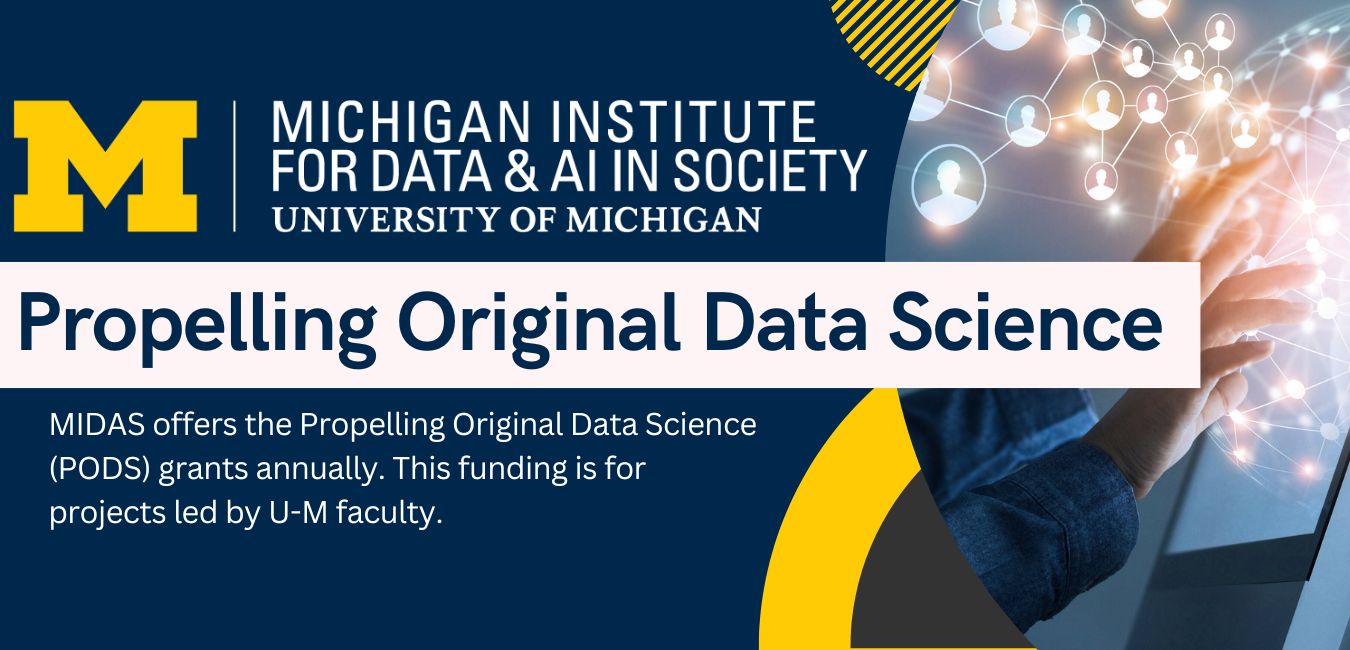The Michigan Institute for Data and AI in Society has announced the recipients of its 2024 Propelling Original Data Science (PODS) Grants. This year, MIDAS collaborated with Microsoft and the Michigan Institute for Healthcare Policy and Innovation to enhance the PODS program’s scope to include focused support for responsible AI endeavors and AI’s application in health policy activities. The 2024 PODS Grants are organized into several focused tracks:
- Track 1: Data Science and AI Methodology and Applications
- Track 2: Accelerating Responsible AI Research Ecosystems
- Track 3: AI for Health Policy and Healthcare: Impact & Governance

The 2024 awardees are:
- WinAI: Propelling UM Soccer with Data-Driven AI
Albert Berahas (College of Engineering) and Raed Al Kontar (College of Engineering) - Human-in-the-loop multi-agent sequential decision-making based Optimal Operation of Power Distribution System
Srijita Das (College of Engineering and Computer Science, U-M Dearborn) and Van Hai Bui (College of Engineering and Computer Science, U-M Dearborn) - Extrapolating with Generative Models for Design of Organic Molecules as Energy Carriers
David Kwabi (College of Engineering), Bryan Goldsmith (College of Engineering), and Yixin Wang (College of Literature, Science and the Arts) - Multimodal Modeling of Cognitive Load at Individual and Team Levels in Acute Care Teams using VR Simulations
Vitaliy Popov (Michigan Medicine), Mohamed Abouelenien (College of Engineering and Computer Science, U-M Dearborn), Michael Cole (Michigan Medicine), and James Cooke (Michigan Medicine) - Combining ecological first principles and AI to better upscale and predict global carbon, nutrient and water cycles on a changing planet
Peter Reich (School for Environment and Sustainability) and Mohammed Ombadi (College of Engineering) - Machine Learning for Automated Fish Detection and Characterization
Katie Skinner (College of Engineering) and Jacob Allgeier (College of Literature, Science and the Arts) - Distributing Expert Attention in Complementary Systems
Sabina Tomkins (School of Information), Derek Van Berkel (School for Environment and Sustainability), Grant Schoenebeck (School of Information), Ariel Hasell (College of Literature, Science and the Arts), and John Ryan (College of Literature, Science and the Arts) - AI-driven Accelerated Optimization for the Design of Sustainable Aviation Fuels
Angela Violi (College of Engineering) - Neural Posterior Estimation (NPE) approaches for fitting high-dimensional stochastic epidemic models to real-world spatiotemporal disease data
Jon Zelner (School of Public Health) and Fan Bu (School of Public Health)
- A Joint Human-AI Framework for Responsible AI
Rita Chin (College of Literature, Science and the Arts) and H.V. Jagadish (College of Engineering) - Advancing Responsible AI by Rethinking the Roles of Marginalized Communities in the Innovation Lifecycle: Developing the UBEC Approach
Shobita Parthasarathy (Ford School of Public Policy), Ben Green (School of Information) and Molly Kleinman (Ford School of Public Policy) - Innovating, Applying, and Educating on Fairness and Bias Methods for Educational Predictive Models
Christopher Brooks (School of Information), Libby Hemphill (Institute for Social Research and School of Information), and Allyson Flaster (Institute for Social Research) - Evaluating Solutions to the Decline of Online Knowledge Communities
Yan Chen (School of Information) and Qiaozhu Mei (School of Information)
Trust, Governance, and Humans in the Loop in Clinical AI
Kayte Spector-Bagdady (Medicine) and Nicholson Price (Law)